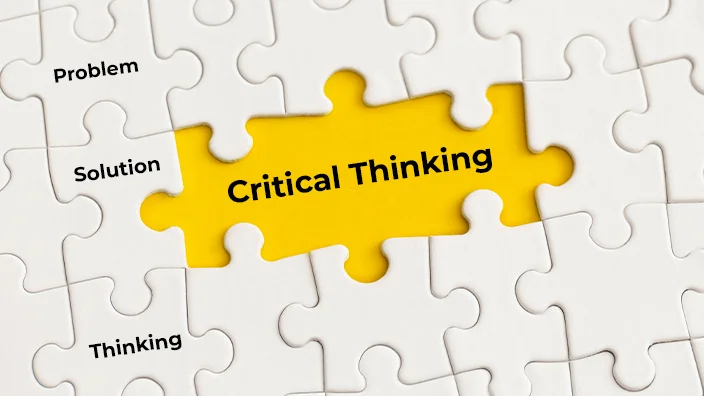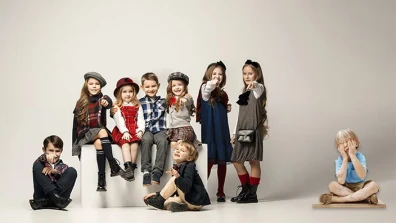You may have been facing some challenges in everyday life that are tough to cope with, because the traditional approaches to them are outdated. You have to adopt 21st-century skills to survive in the workplace, society, and other settings.
Critical thinking is one of the 21st century's most important skills with which you can; build up logical arguments, solve problems, cope with the barriers in your ways, and achieve your short-term as well as long-term goals.
Why is it necessary to develop critical thinking skills? This study is about thinking critically, the characteristics of critical thinking, what is critical thinking, and barriers to critical thinking in the world.
Table of Contents
What is Critical Thinking?
Critical thinking is a kind of thinking based on rationality, logic, arguments, and reasoning and is goal-directed. Critical thinking is objectively assessing and evaluating information and forming reasonable judgments of them.
Effective Critical thinkers do not accept anything without applying the above-mentioned traits, they build their logical knowledge and enhance self-reflection. Critical thinking is one of the vital 21st-century skills and intellectual virtues.
Similar Study: Managing Remote Teams
Positive Traits
Critical thinking possesses countless positive traits like effective communication, problem solving, curiosity, humility, enquiring all the data, compassion, introspection, making inferences, and many more others.
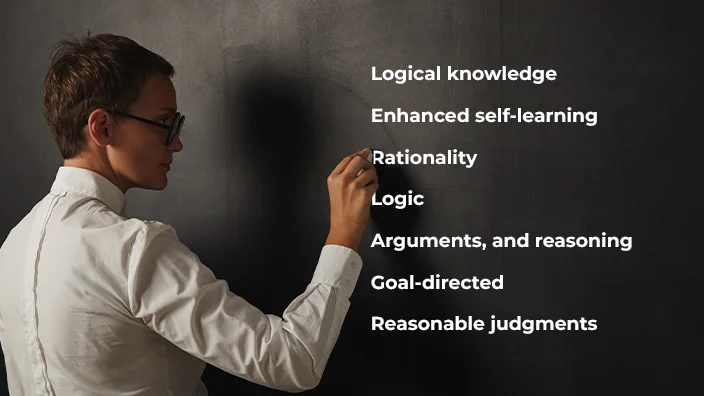 Critical thinking relies on; logical knowledge, enhance self improvement, rationality, logic, arguments, and reasoning.
Critical thinking relies on; logical knowledge, enhance self improvement, rationality, logic, arguments, and reasoning.
It is goal-directed, objectively assessing and evaluating information and forming reasonable judgments of them.
Origin
The history of critical thinking is traced back to the great philosopher Socrates, he was the first one to think critically and encouraged his students to do so.
Socrates was of the view that learners will not only question other but also their deeper knowledge, by doing so they will be able to think reasonably and build logical arguments. Thus, critical thinking was originated in Ancient Greece.
After that, some other legends shaped our modern lives, among them the most famous are; Henry Ford, Elbert Einstein, Marie Curies, Sigmund Freud, etc. They drew lines to think critically and defined all the characteristics of critical thinking.
Significance
What is the importance of critical thinking? Critical thinking is significant in getting new information, making decisions, deeper understanding of complex details with the help of breaking in components and questioning not only others but also yourself.
It is crucial for academic learning, students must have to develop it. Employees without critical thinking have no face value and are worthless.
An employee with critical can effectively communicate with his team and can find out alternative solutions to problems.
Why Critical Thinking is Important?
Teach critical thinking and enhance critical thinking with creativity, criticality, problem solving, and other characteristics of critical thinking.
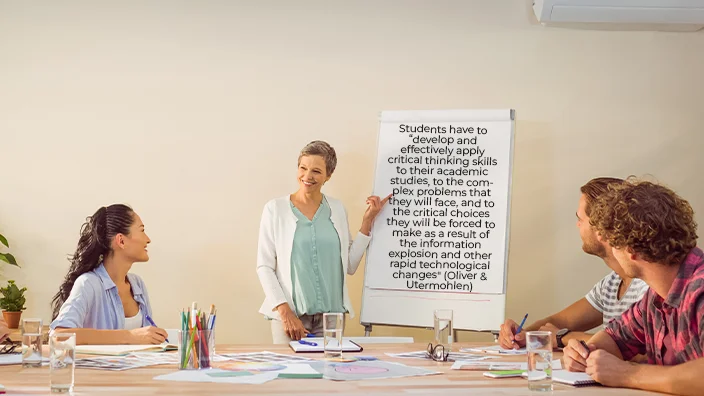 Other characteristics of critical thinking that need to be developed in the students are how to; ask questions, think critically, consume and accept information, effectively communicate, solve problems, enquire about data, introspect, and question the status quo and own beliefs.
Other characteristics of critical thinking that need to be developed in the students are how to; ask questions, think critically, consume and accept information, effectively communicate, solve problems, enquire about data, introspect, and question the status quo and own beliefs.
How Can it be Developed?
It can be developed in the manner if you ask basic questions of why and how, try to participate in solving puzzles and games that need critical thinking.
You start questioning yourself, listen carefully and do not accept knowledge without enquiring, develop foresight, try to solve problems with technical skills, and control your mental process.
Other ways of developing critical thinking skills are; getting rid of barriers to critical thinking, effective communication, enquiring facts, introspection, questioning yourself, seeing the consequences of your actions, seeking a mentor or getting professional coaching, and building logical arguments.
Characteristics
The main concern of the study is to discuss characteristics of critical thinking, in the following sections the importance with the developing strategies will be discussed.
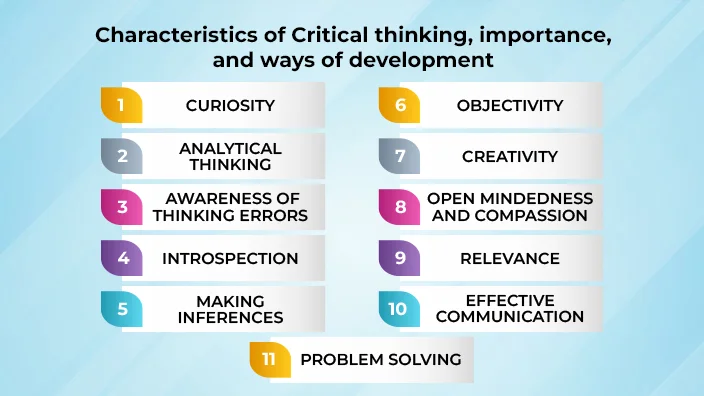
Curiosity
Among the characteristics of critical thinking, the first one is curiosity. It is the search for knowledge and quenching the thirst for building logical knowledge.
With curiosity, you will always gather information and will question your already built knowledge with the new reasonable detached data. It is the ability to find new ways to solve problems and get rid of barriers to critical thinking.
Importance
It enables you to; get relevant information with facts, solve complex problems in effective ways, question yourself, and always be curious about crossing the borders of traditional thinking and the banking model of learning.
Developing Curiosity
Always clear your ambiguities by asking questions, searching things on Google, and clarifying them with authentic sources. Develop your interest in reading books, and playing and solving puzzling games.
Analytical Thinking
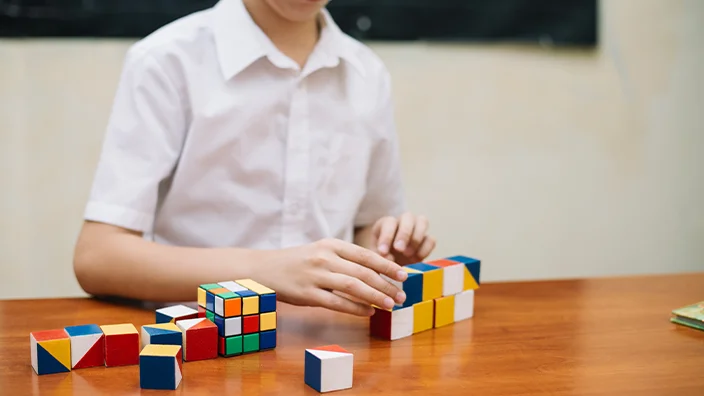 Analytical thinking involves analysis, analyzing complex ideas with breaking down them into simplest forms. If you still have difficulty, then gather your prior knowledge and reach a decision.
Analytical thinking involves analysis, analyzing complex ideas with breaking down them into simplest forms. If you still have difficulty, then gather your prior knowledge and reach a decision.
Whenever you get some confusion about something, break it down into smaller pieces or chunks and then see it from other angles.
Importance
It helps you in solving your problems and making informed decisions. Analytical thinking is crucial for academic life, employment, leadership, team work, and other activities.
It also allows you to focus on the small chunks of bigger details and examine issues from multiple perspectives.
Developing Analytical thinking
You have to notice all your actions, what you do, how you do, when to do etc. Always try to divide or break down any concept, idea, work, assignment, etc. into small chunks and then try to understand.
Awareness of Thinking Errors
Awareness of thinking errors is significant among other characteristics of critical thinking, all good critical thinkers are aware of their logical fallacies, errors in reasoning, logic in arguments, and data in debates.
They are always curious person of their awareness and do not let themselves the victims of illusions. Common errors in thinking may be circular reasoning, confusion in correlation, and shortcut bias in cognition.
Importance
With the help of awareness, you will not throw yourself in the lap of fallacies, you will be aware of your; thinking, situation, learning, knowledge, experiences, reasoning, evidence, curiosity, argument, facts, and other useful traits.
Developing Awareness
Introspecting yourself that what you learn, listen and teach is either correct or not. With the help of brainstorming, solving puzzles, mind games, and other cognitive activities you can develop awareness.
Introspection
Critical thinking compels you to think over your thought processes and emotions. Like other characteristics of critical thinking, it is significant in bringing creativity and criticality.
 Not questioning yourself and your thoughts are the barriers to critical thinking, you have to think about your thinking.
Not questioning yourself and your thoughts are the barriers to critical thinking, you have to think about your thinking.
It has been reported in numerous researches that we can improve our thinking with the help of metacognition which is analyzing your reasoning process.
Importance
You can inspect yourself with self awareness and curiosity, so for critical thinking introspection is necessary.
It is a kind of self accountability system with which you can measure your own biases, selfish tendencies, prejudices, and your priorities. If you are aware of yourself, you can judge your biases and prejudices.
Developing Introspection
You can cope up the barriers to critical thinking. All you have to do is write down what is wrong and what is right, develop your reasoning, and then make judgments of your thinking errors.
Making Inferences
Inferences are vital for knowledge, without getting a conclusion you cannot get insights into a concept.
Inferences are among those characteristics of critical thinking that draw conclusions based on reviewing heartless scientific facts, reasons, logic, and ideas.
Whatever you observe, learn, and examine must be essential for something, some making inferences will enable you to determine the purpose of that learning and examination.
Importance
It is significant to decide the valid facts to accept and to avoid less useful or not useful assumptions.
It is important for academics, employment, and real life, social life is all about deciding what is wrong and what is right, so when you make an inference about something you will get the insights.
Developing the Skill
Be watchful of your daily affairs, either in the classroom, workplace, or in society.
There is a simple equation for developing inferences, add your observation to your prior knowledge, and you will get critical thinking as a product.
Objectivity
Objectivity helps you throw away your biases and personal feelings while learning, listening, or teaching something.
 It is one of the best characteristics of critical thinking with which you can stay positive rather than negative.
It is one of the best characteristics of critical thinking with which you can stay positive rather than negative.
It is crucial for evaluating facts and evidence, self-awareness helps you to stay objective. You should remove human elements like; your ego, your emotions, and your biasedness to analyze something.
Importance
Objectivity is important for critical thinking, scientists have objective appeal to new evidence and facts. They draw inferences on the grounds of objectivity, so it is crucial for evidence and fact.
How to Develop Objectivity
You have to keep aside your self while analyzing a given situation. Your ego, biases, emotions, and false arguments are the barriers to critical thinking, so try to negotiate something with different perspectives.
Creativity
With these important skills, you can solve a problem, get knowledge, bring productivity, and experiment with new things. Employers recognize creative employees are hired by employers for productivity.
Importance
Creativity is the most essential part of productivity, if you are creative you will bring something new with experimentation. It is crucial for challenges, whatever the situation may be, you can cope with creativity.
How to Develop Creativity
Developing creativity is only possible by with experimenting new things. Working with the traditional ways is the barrier to critical thinking and creativity.
Open mindedness and Compassion
Open mindedness and compassion are both the key to criticality, you cannot be critical thinking with the traditional baking concepts. Whatever you listen, face, and observe requires you to be compassionate and open minded.
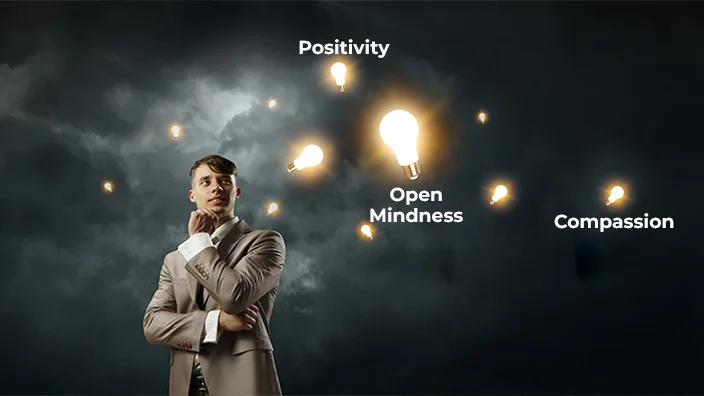 It is crucial among other characteristics of critical thinking, with an open mind you can welcome new ideas and to observe all the angles of a situation.
It is crucial among other characteristics of critical thinking, with an open mind you can welcome new ideas and to observe all the angles of a situation.
Compassionate people are effective critical thinkers, they approach others with empathy even if they disagree. You have to respect other’s ideas and suggestions even if they are wrong.
Importance
Open mindedness and compassion both are necessary like other characteristics of critical thinking, with which you can respect other ideas and accept others’ views. You cannot betray yourself if you open mindedly enquire and learn.
Developing the Trait
It can be adopted with dealing with new ideas and introspecting yourself on what is good for you. With books and social media like listening to podcasts, news analysis, and other opinions of senior analysts you can develop it.
Relevance
Relevance is what you connect with your prior knowledge, it enables you to relate new things with already existing.
If you are a student and want to manage your time well, just opt for the relevant ideas, facts, and reasoning and get rid of irrelevant ones.
Importance
Relevance is crucial for effective communication and problem solving, it will make a good speaker, and opting for the relevant will enable you to the point.
It is a kind of filter for your cognition with which you can welcome the pleasant and unwelcome the unpleasant.
How to Develop Relevance
Be curious and self-aware of what you say and what you listen, while saying something we often go irrelevant and cannot differentiate between the facts.
Effective communication
Effective communication is useful for all, you cannot survive without it in higher education and progressive education. Society, educational institutions, workplaces etc. want you to be an effective communicator.
With of it, you can; convey what you think, solve problems, and share opinions and experiences. Effective communicators must have; active listening, presence of mind, and supporting other views.
Importance
Not actively participating in a situation is one of the barriers to critical thinking. You will be able to learn when you actively listen and then enquire ambiguities.
Developing Effective Communication
It is very easy to develop this skill, pay attention to others’ opinions, and convey softly and politely what you think of their views. Try it with your friends, family members, colleagues and teachers.
Problem Solving
Problem solving is a skill necessary for daily life, you may face some problems every day either in the workplace or social settings.
 However, all of them require you to learn and apply all characteristics of critical thinking. Problem-solving is finding out the best solution for challenges.
However, all of them require you to learn and apply all characteristics of critical thinking. Problem-solving is finding out the best solution for challenges.
Importance
Problem solving is vital in getting rid of tough situations, you can only find the possible solutions by adopting the characteristics of critical thinking.
Developing Problem Solving
Try solving puzzles, mind games, and other cognitive activities that drag you to force your mind to find the solutions. Like other characteristics of critical thinking, it can be developed with practice.
Your ego, biases, emotions, and false arguments are the barriers to critical thinking, so try to negotiate something with different viewpoints instead of escaping a situation.
Conclusion
What is critical thinking? Critical thinking definition varies but the most acceptable is, to objectively assess and analyze information and form reasonable judgments.
The characteristics of critical thinking include; curiosity, problem solving, effective communication, self-awareness, introspection, objectivity, making inferences, creativity, open mindedness and compassion, creativity, and countless more.
Barriers to critical thinking are not participating in solving puzzles, playing mind games, accepting things as they are, and not enquiring oneself.
Frequently Asked Questions
What are the features of critical thinking?
The features of critical thinking include; curiosity, problem solving, effective communication, self-awareness, introspection, objectivity, making inferences, creativity, open mindedness and compassion, and countless more.
What are the 5 critical thinking skills?
The five critical thinking skills are; problem solving, introspection, curiosity, analytical thinking and creative thinking.
What are the four general characteristics of an effective critical thinker?
The four general characteristics of an effective critical thinker are; Objectivity, creativity, open-mindedness and compassion, analytical thinking, and curiosity.
What are the 9 principles of critical thinking?
The principles of critical skills are; rationality, logical arguments, reasoning, goal-directedness, awareness of thinking errors, curiosity, problem solving, effective communication, making inferences, and creativity.
